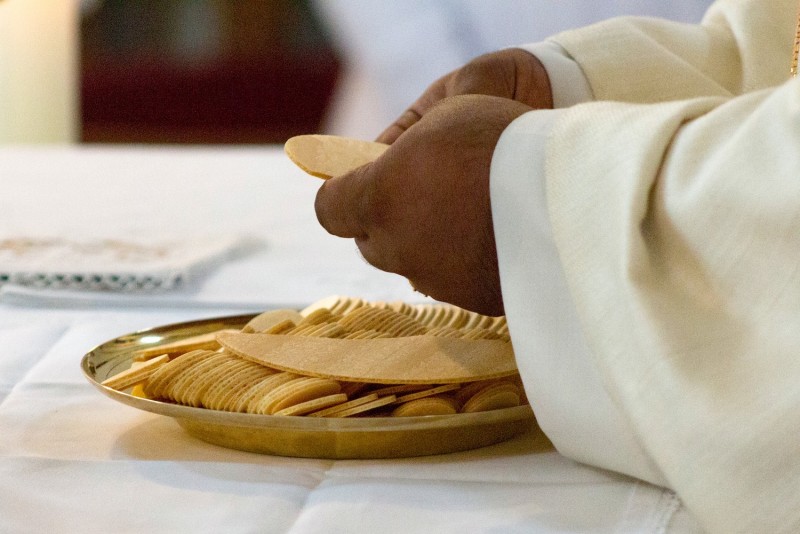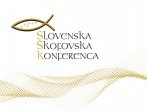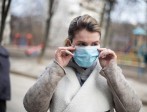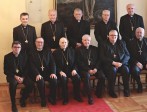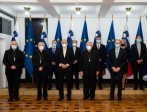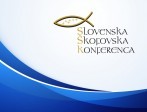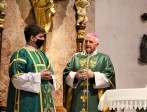At the session of the SBC Permanent Council, held on December 18, 2020, the ordinaries welcomed the Ordinance of the Government of the Republic of Slovenia on the temporary restriction of the joint exercise of religious freedom in the Republic Slovenia of December 16, 2020, and the lifting of the ban on religious ceremonies. At the same time, they adopted new Instructions of Slovenian Bishops for the Celebration of Holy Masses during the COVID-19 Epidemic. Bishops decided to consider the epidemiological situation in individual statistical regions in the reintroduction of the liturgy. Based on this information, each ordinary will choose whether to celebrate Holy Masses with the people in his diocese. The decisions will be published in individual dioceses’ website on Friday, December 18, 2020, by 7 p.m. Where ordinaries will permit the celebration of Holy Masses with the participation of believers, it will be subject to the following instructions[1]:
1. We encourage all believers, priests, religious (men and women) and Catholic lay movements, to strengthen prayer for health, patients, health workers, deceased and their relatives, the blessing of our nation and the end of the pandemic.
2. Holy Masses with the participation of believers are permitted under the following conditions:
a) There can be as many believers (including liturgical associates) in a church if they comply with one person (or one family or members of a joint household) per 30-m2 regulation. The priest (s) are entirely exempt from this condition by ordinance. The church's surface is the entire interior area of the nave, transepts and side chapels, chancel and choir (floor area).
b) Participation in Holy Masses is permitted only to healthy believers who have no respiratory infection symptoms, do not cough, do not have a fever and whose household members are not infected.
c) All present people (participants and priest) must wear masks and keep an interpersonal physical distance of at least 1.5 meters at all times and disinfect their hands on arrival and departure. Every other row (bench) must remain empty.
d) Believers are not permitted to socialize or hover near the church before and after the Holy Mass.
e) The priest must wear a mask during Holy Mass.
f) Following the government Ordinance, singing (choral, folk music or solo singing) is prohibited during Holy Mass, including the priest's singing. An organist can participate in the Holy Mass.
g) During the Holy Mass, the vessels with communion for believers are covered.
h) The handshake in exchanging of peace is dropped.
i) Believers are allowed to receive Holy Communion only in the hand. Eucharist ministers must wear masks. They must disinfect their hands before and after communion. When in line for the communion, believers should respect a person-to-person distance of 1.5 meters.
j) Believers give their donations for the church in a designated box(basket).
k) Before and after Holy Mass, no form of gathering or socialising in the church or in front of the church is permitted, (e.g. concerts, Christmas afternoon gatherings in the church, banquets, prayer hours, prayers of the faithful etc.).
l) After the Holy Mass, the church must be thoroughly ventilated.
3. Following the general prohibition on association people must not gather outside churches (e.g. listen to Holy Mass in front of the church by loudspeaker, organize Holy Mass in a yard or square or field).
4. Following the decree of the Congregation for Divine Worship and the Discipline of the Sacraments of December 16, 2020, the ordinaries allow priests to celebrate four masses on December 25.
5. Christmas midnight masses are cancelled. However, a Christmas Mass can be celebrated on Christmas Eve (cf. the Roman Missal p. 33), only on Thursday, December 24, 2020, ending at 20.00.
6. While considering the epidemiological situation and ensuring adequate access to spiritual care to all believers, the priest may decide to provide a joint reception of communion instead of a holy mass. In doing so, he must consider all the above measures and restrictions applicable to Holy Masses.
7. The priest must provide additional written warnings regarding at least 1.5 meters of interpersonal distance between believers when visiting the nativity scene.
8. Anyone entering the sacral space (church, chapel, a hall where liturgy is taking place, etc.), is responsible for their protection against possible infection, as is the case with entry into other public spaces.
9. Bishops recommend that priests and believers install the #Ostanizdrav application on their phones.
10. The sick and the elderly should follow the Holy Masses in the media, receive spiritual communion, dedicate time to prayer and reading of God's word or good deeds (cf. CCL, Can. 1248, § 2). The Holy Masses' broadcast, celebrated by the bishops, will take place on Television Slovenia, Radio Ognjišče and Tv Exodus.
11. Personal prayer of believers is permitted in the church following the restrictions applicable to holy masses.
12. Confession is permitted. Adequate protection must be installed in confessionals between a confessor and a confession receiver (e.g.PVC foil), and a distance of 1.5 meters must be guaranteed. The confessional must be regularly ventilated and cleaned. A confession receiver must disinfect their hands and enter with a mask. Confession by telephone and online is expressly prohibited as secrecy is not guaranteed. Priests and believers are obliged to comply with this norm. A regular form of confession is a personal confession.
13. The sacraments of Holy Baptism and Matrimony may be administered in the circle of families or the same households. The first Holy Communions and Confirmations are postponed until further notice.
14. The Anointing of the Sick is permitted if the priest and patient are adequately protected (masks N95/KN95/FFP2/FFP3 type). The priests for the sick and priests who care for nursing homes and other similar institutions must follow the said institutions' instructions for the prevention of infections and obtain from them appropriate protective equipment. A priest should wear a mask while visiting a patient at home and disinfects his hands before and after. Visiting patients in their homes on first Fridays are allowed.
15. Church funerals are performed in agreement with the funeral service and considering all instructions of the NIJZ. To shorten the queues for cremation, we invite believers to bury their deceased relatives classically, in a coffin.
16. Catechesis (religious instruction) and other forms of pastoral activity are carried out remotely.
17. The parish office may be open for one person or one family or one household at a time. The priest and the believer must wear masks disinfect their hands before and after a visit.
18. Spiritual seminars, lectures (meetings) conducted by bishops, priests, religious (men and women) and laypeople from abroad are not allowed.
19. Charitable institutions and Catholic educational institutions shall follow instructions issued by their managements, subject to national regulations.
The parish priest or the person in charge is responsible for possible government ordinance and sectoral legislation violations. In the event of an inspection procedure or police action, the person responsible should inform the SBC Secretariat as soon as possible to the e-mail address: [email protected].
The measures taken shall remain in force until revoked. Suppose there is a deterioration in health and tightening of state instructions. In that case, each ordinary will adopt additional restrictions for his diocese in the field of parishes' religious or liturgical life. Priests and other pastoral workers are kindly requested to post the instructions on parish websites and social networks.
Additional information is published at the SBC website: https://katoliskacerkev.si.
These instructions enter into force on Saturday, December 19, 2020. The Instructions of Slovenian bishops during the COVID-19 epidemic, which have been in force since November 13, 2020, cease to be valid.
Msgr Stanislav Zore, Metropolitan Archbishop of Ljubljana and President of SBC
Msgr Alojzij Cvikl, Metropolitan Archbishop of Maribor and Vice President of SBC
Msgr Dr Jurij Bizjak, Bishop of Koper
Msgr Dr Peter Štumpf, Bishop of Murska Sobota
Msgr Andrej Glavan, Bishop of Novo mesto
Rev. Rok Metličar, administrator of the Diocese of Celje
[1] The ordinaries accept the following instructions following the constitutionally guaranteed human rights and fundamental freedoms to individual and collective aspects of freedom of religion, the Code of Cannon Law (Cann. 455, § 1-2; 381; 391, § 1 CCL), Directory for the Pastoral Ministry of Bishops Apostolorum successoress (Articles31 and 64), within the framework of the autonomy of constitutionally guaranteed freedom of religion, taking into account national regulations and prior notification of the competent state institutions, and preventing the spread of the epidemic COVID-19 and preserving the health of believers and the Slovenian population. The instructions have been supplemented based on a positive opinion and comments from the NIJZ and regulations of the Government of the Republic of Slovenia. They comply with the Ordinance amending the Ordinance on the temporary restriction of the gathering of people at the public places and areas in the Republic of Slovenia and the prohibition of the movement of certain types of goods and products during the gathering of people (Official Gazette of the Republic of Slovenia, No. 143/20) and are following Article 39 of the Communicable Diseases Act (Official Gazette of the Republic of Slovenia, No. 33/06 - officially consolidated text and 49/20), which stipulates that the government of the Republic of Slovenia may prohibit or restrict the movement of the population in infected or directly endangered areas and prohibit gathering of people in schools, cinemas, public premises and other public places until the danger of spreading a contagious disease ceases. They also take into account Article 5 of the Public Assembly Act (Official Gazette of the Republic of Slovenia, No. 64/11), which does not apply to religious ceremonies in buildings or premises designated for religious activity, and public spaces which form a whole with the land on which the building designated for the exercise of religious activities stands, and the position of the Constitutional Court of the Republic of Slovenia from the decision on the assessment of the constitutionality of the Census of Population Households and Housing in the Republic of Slovenia (OfficialGazette of the Republic of Slovenia, No. 22/02, items 18–19) that the binding definition of an individual on religion (i.e. obligatory management records of those present at the Holy Mass) constitutes an interference with the right referred to in the second paragraph of Article 41 of the Constitution of the Republic of Slovenia.

